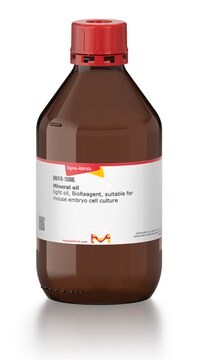324517
eIF4E/eIF4G Interaction Inhibitor, 4EGI-1
The eIF4E/eIF4G Interaction Inhibitor, 4EGI-1, also referenced under CAS 315706-13-9, controls the biological activity of eIF4E/eIF4G interaction. This small molecule/inhibitor is primarily used for Phosphorylation & Dephosphorylation applications.
别名:
eIF4E/eIF4G Interaction Inhibitor, 4EGI-1, 2-((4-(3,4-Dichlorophenyl)-thiazol-2-ylhydrazono)-3-(2-nitrophenyl))propionic acid, eIF4F Inhibitor I
登录查看公司和协议定价
所有图片(1)
About This Item
推荐产品
品質等級
化驗
≥98% (sum of two isomers, HPLC)
形狀
solid
製造商/商標名
Calbiochem®
儲存條件
OK to freeze
protect from light
顏色
yellow
溶解度
DMSO: 100 mg/mL
運輸包裝
ambient
儲存溫度
2-8°C
InChI
1S/C18H12Cl2N4O4S/c19-12-6-5-10(7-13(12)20)15-9-29-18(21-15)23-22-14(17(25)26)8-11-3-1-2-4-16(11)24(27)28/h1-7,9H,8H2,(H,21,23)(H,25,26)/b22-14+
InChI 密鑰
KFRKRECSIYXARE-HYARGMPZSA-N
一般說明
A cell-permeable hydrazone compound that reversibly binds eukaryotic translation initiation factor 4E (eIF4E; KD = 25 µM) and disrupts eIF4E/eIF4G, but not eIF4E/4E-BP1, complex formation. Reported to downregulate the protein, but not mRNA, levels of c-Myc and Bcl-xL in Jurkat cells (8 h), leading to apoptotic cell death after prolonged exposure (24 h, IC50 = ~ 25 µM). Also available as a 25 mM solution in DMSO (Cat. No. 324519).
A cell-permeable hydrazone compound that reversibly binds eukaryotic translation initiation factor 4E (eIF4E; KD = 25 µM) and disrupts eIF4E/eIF4G, but not eIF4E/4E-BP1, complex formation. Reported to downregulate the protein, but not mRNA, levels of c-Myc and Bcl-xL in Jurkat cells (8 hrs), leading to apoptotic cell death after prolonged exposure (24 hrs, IC50 ~25 µM).
包裝
Packaged under inert gas
警告
Toxicity: Harmful (C)
重構
Following reconstitution, aliquot and freeze (-20°C). Stock solutions are stable for up to 6 months at -20°C.
其他說明
Moerke, N. J., et al. 2007. Cell128, 257.
法律資訊
CALBIOCHEM is a registered trademark of Merck KGaA, Darmstadt, Germany
儲存類別代碼
11 - Combustible Solids
水污染物質分類(WGK)
WGK 3
閃點(°F)
677.1 °F - (calculated)
閃點(°C)
358.4 °C - (calculated)
Gerald C Tiu et al.
Developmental cell, 56(14), 2089-2102 (2021-07-10)
In ribosomopathies, perturbed expression of ribosome components leads to tissue-specific phenotypes. What accounts for such tissue-selective manifestations as a result of mutations in the ribosome, a ubiquitous cellular machine, has remained a mystery. Combining mouse genetics and in vivo ribosome profiling
我们的科学家团队拥有各种研究领域经验,包括生命科学、材料科学、化学合成、色谱、分析及许多其他领域.
联系技术服务部门






